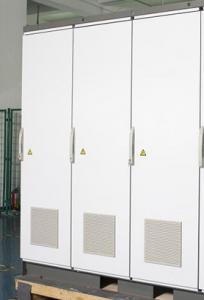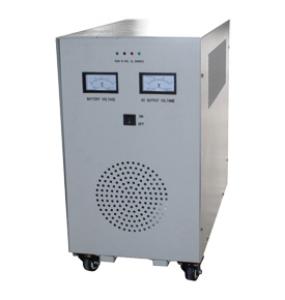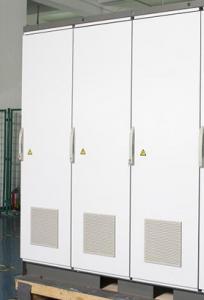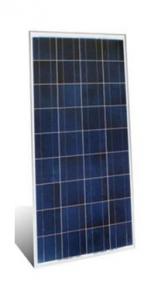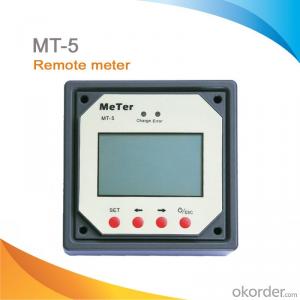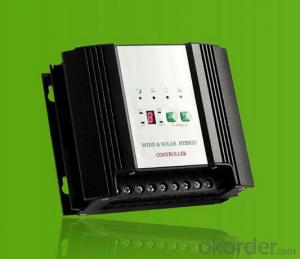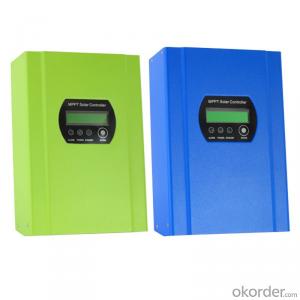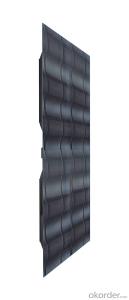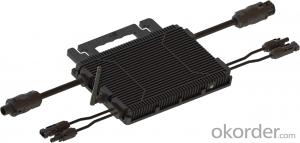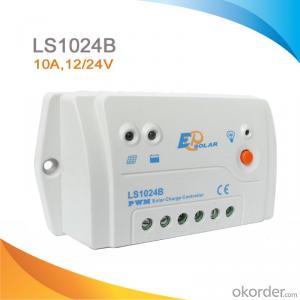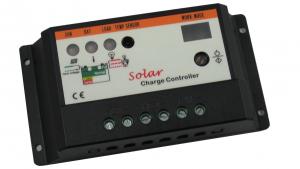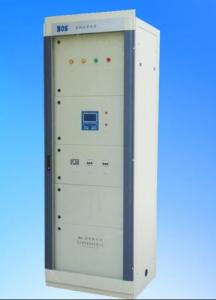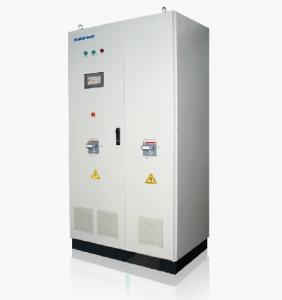PV Off-Grid Inverter and Controller Hybrid GNS-0.3KB
OKorder Service Pledge
OKorder Financial Service
You Might Also Like
Description;
CNBMSOLAR is a world-leading and Vertical integrated manufacturer of high-performance with Silicon,
Wafer, Cells, Modules, which convert sunlight into electricity for residential, commercial, and utility-scale
power generation.
The capacity of CNBMSOLAR is reach to 1GW, and make sure each year our shipment capacity is more
Than 700-800MWs, at the same time, we have set up the largest solar power station with our partner
in Ukraine.
CNBM is a Quality + Service oriented company with“Excellence at Each Step” approach, composed of
the finest components from TUV and IEC-certified partners around the world, CNBM modules consistently
undergo a variety of trials at the company’s Test & Development Centre, ensuring peak performance
capabilities. The company is committed to develop and provide the world with clean and renewable energy
to ease the energy shortages as well as human kind’s impact on the environment.
Data:
Technical specifications |
| |
Model | GNS-0.3K20B | |
Rated Capacity(KVA) | 0.5 | |
DC Input | Rated Voltage(VDC) | 12 |
Low Voltage(VDC) | 10.8 | |
Low Voltage Resume (VDC) | 13.2 | |
Load Overvoltage(VDC) | 17 | |
Overvoltage Resume(VDC) | 16.5 | |
PV Input | Rated Current on charging(A) | 20 |
Charge Loop | 1 | |
Overcharge protection(VDC) | 14.4 | |
Overcharge Resumption(VDC) | 14.2 | |
Anti lightning | varistor lighting protection | |
Grid input | No grid transfer function | |
Rated capacity | Output Waveform | sinewave |
Overload ability | 120% 1min | |
Output voltage(VAC) | 220±3% | |
Output frequency(Hz) | 50±0.1% | |
THD | ≤3℅(THD) | |
Dynamic Response(0~100%) | 5% | |
Efficiency | ≥80% | |
Continous running time | Continuous operation | |
Display | LCD/LED/Meter | |
Protection | Overcharge, overdischarge, overload, short circuit, reverse polarity, internal overheated protections,etc | |
Protection class | IP20 | |
Environment | Noisy | ≤50(dB/m) |
Operating temperature range | -10~+50(℃) | |
Storage temperature range | -25~+55(℃) | |
Operating humidity | 0~95%(non-condensing) | |
Max.altitude(above sea level) | ≤5000(m) | |
Product Dimension (mm) | 520*273*451 | |
Weight(kg) | 80kg | |
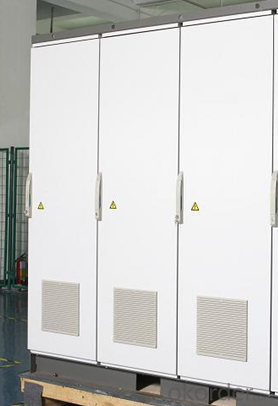
FAQ:Could you introduce more about CNBM
CNBM Group is short for China National Building Materials Group Corporation, which is established in 1984 with approval from the State Council
CNBM Group is the largest comprehensive building materials industry group in China
The Group has a total asset of over RMB 360 billion, more than 180,000 employees and 17 subsidiaries
- Q:Can a solar controller be used with solar panels that are mounted on a moving vehicle?
- Yes, a solar controller can be used with solar panels that are mounted on a moving vehicle. The solar controller regulates and optimizes the charging process of the batteries connected to the solar panels, regardless of whether they are stationary or in motion. It ensures that the batteries receive the appropriate voltage and current from the solar panels, maximizing their charging efficiency and protecting them from overcharging or damage.
- Q:How does a solar controller handle temperature compensation for batteries?
- A solar controller handles temperature compensation for batteries by adjusting the charging voltage based on the battery temperature. As temperature affects the charging efficiency and capacity of batteries, the controller measures the temperature and modifies the charging parameters accordingly to optimize the charging process. This ensures that the batteries are charged at the correct voltage level, preventing overcharging or undercharging, and prolonging their lifespan.
- Q:Can a solar controller be used with solar-powered well pumps?
- Yes, a solar controller can be used with solar-powered well pumps. A solar controller is typically used to regulate and optimize the charging of batteries in a solar power system. It helps to prevent overcharging and ensure the efficient utilization of solar energy. In the case of solar-powered well pumps, the solar controller can be used to manage the power flow from the solar panels to the pump, ensuring a reliable and consistent water supply.
- Q:How does a solar controller handle the protection against electrical surges?
- A solar controller handles protection against electrical surges by incorporating surge protection devices (SPDs) or transient voltage suppressors (TVS) in its circuitry. These devices are designed to divert excess voltage or current away from sensitive components, preventing damage caused by electrical surges. Additionally, solar controllers may also employ overvoltage and overcurrent protection mechanisms to ensure the system stays within safe operating limits during such events.
- Q:Can a solar controller be used with different types of solar power systems?
- Yes, a solar controller can be used with different types of solar power systems. A solar controller, also known as a charge controller, regulates the power flow between the solar panels and the battery or grid. It ensures that the battery is charged efficiently and prevents overcharging or discharging. Solar power systems can be categorized into off-grid and grid-tied systems. Off-grid systems are typically used in remote areas where there is no access to the utility grid, while grid-tied systems are connected to the utility grid. Solar controllers are compatible with both off-grid and grid-tied systems. In off-grid systems, the solar controller manages the charging and discharging of the battery, ensuring optimal performance and extending battery life. It also protects the battery from overcharging and over-discharging, which can cause damage. In grid-tied systems, the solar controller plays a different role. It monitors the power output of the solar panels and ensures that it is synchronized with the utility grid. It also manages any excess power generated by the solar panels, diverting it to the grid or to other loads. This helps to maximize the efficiency of the solar power system and potentially earn credits through net metering programs. Overall, a solar controller is a crucial component in any solar power system, regardless of the type. It helps to regulate the flow of power, protect the battery, and optimize the performance of the system. Therefore, it can be used with different types of solar power systems to enhance their efficiency and reliability.
- Q:How do I upgrade or expand a solar controller system?
- To upgrade or expand a solar controller system, you can follow these steps: 1. Assess your current system: Evaluate the capacity and performance of your existing solar controller system. Determine if it is capable of accommodating the desired expansion or if an upgrade is necessary. 2. Determine your requirements: Identify the specific enhancements or additions you wish to make to your solar controller system. This could involve increasing the number of solar panels, adding battery storage, or integrating advanced monitoring and control features. 3. Consult an expert: Seek advice from a professional solar installer or technician who can provide guidance on the best approach to upgrade or expand your system. They can assess the feasibility, recommend suitable equipment, and offer insights on any necessary modifications. 4. Plan for system compatibility: Ensure that any new components or equipment you plan to introduce are compatible with your existing solar controller system. This includes considering factors such as voltage and communication protocols. 5. Install and integrate new components: Work with a qualified technician to install any new solar panels, batteries, or other equipment required for the upgrade. They can also assist with configuring the system to optimize performance and ensure seamless integration. 6. Test and monitor: Once the upgrade or expansion is complete, thoroughly test the system to ensure everything is functioning as intended. Monitor its performance regularly to identify any issues or areas for improvement. Remember, it is crucial to prioritize safety and comply with local regulations when upgrading or expanding a solar controller system. Engaging with professionals and experts in the field will help you navigate the process smoothly and effectively.
- Q:Can a solar controller be used with solar-powered emergency backup systems?
- Yes, a solar controller can be used with solar-powered emergency backup systems. A solar controller helps regulate the charging and discharging of batteries in solar power systems, including emergency backup systems. It ensures that the batteries are charged efficiently and protected from overcharging or deep discharging. Using a solar controller increases the overall efficiency and lifespan of the batteries, making it a crucial component in solar-powered emergency backup systems.
- Q:What is the role of a solar controller in preventing damage to the solar panels from overvoltage conditions?
- The role of a solar controller in preventing damage to the solar panels from overvoltage conditions is to regulate and control the amount of voltage and current flowing from the solar panels to the batteries or grid. It ensures that the voltage stays within safe limits by monitoring the charging process and preventing overcharging. By effectively managing the flow of electricity, the solar controller protects the solar panels from potential damage caused by excessive voltage and helps maximize their lifespan and efficiency.
- Q:Can a solar controller be used with any type of solar panel?
- No, a solar controller cannot be used with any type of solar panel. The compatibility between the solar controller and the solar panel depends on various factors such as the voltage and current ratings of the panel, as well as the type of technology used in the panel (e.g., monocrystalline, polycrystalline, or thin-film). It is important to ensure that the solar controller is compatible with the specific characteristics of the solar panel to ensure optimal performance and safety.
- Q:Can a solar controller be used with solar-powered lights?
- Yes, a solar controller can be used with solar-powered lights. A solar controller is designed to regulate and optimize the charging and discharging of batteries in a solar power system. It helps monitor the battery's state of charge and ensures that the solar-powered lights receive the right amount of power at all times.
1. Manufacturer Overview |
|
|---|---|
| Location | |
| Year Established | |
| Annual Output Value | |
| Main Markets | |
| Company Certifications | |
2. Manufacturer Certificates |
|
|---|---|
| a) Certification Name | |
| Range | |
| Reference | |
| Validity Period | |
3. Manufacturer Capability |
|
|---|---|
| a)Trade Capacity | |
| Nearest Port | |
| Export Percentage | |
| No.of Employees in Trade Department | |
| Language Spoken: | |
| b)Factory Information | |
| Factory Size: | |
| No. of Production Lines | |
| Contract Manufacturing | |
| Product Price Range | |
Send your message to us
PV Off-Grid Inverter and Controller Hybrid GNS-0.3KB
OKorder Service Pledge
OKorder Financial Service
Similar products
New products
Hot products
Hot Searches
Related keywords
